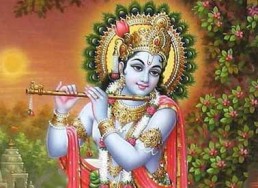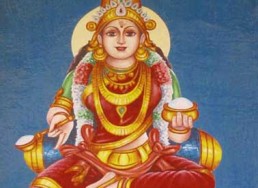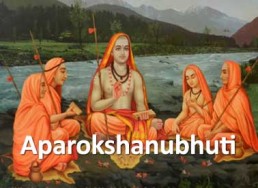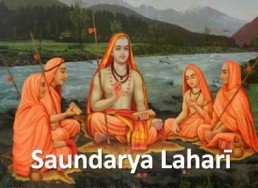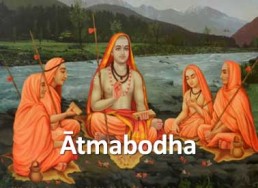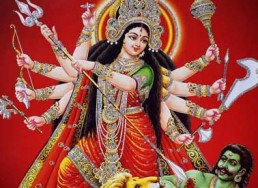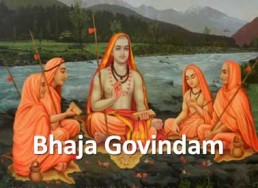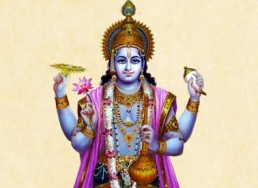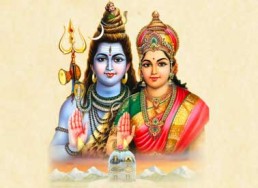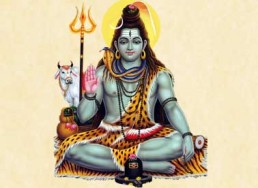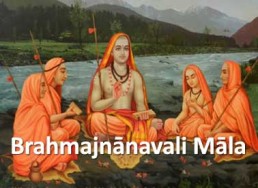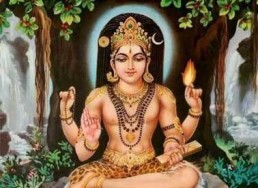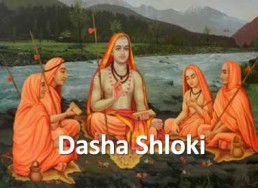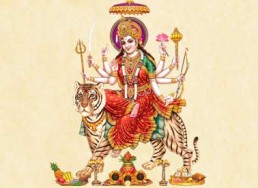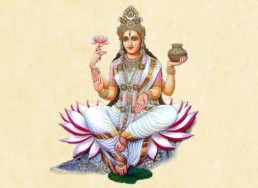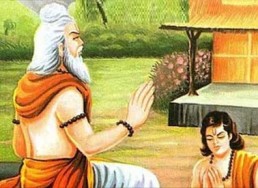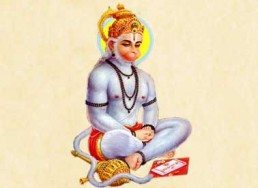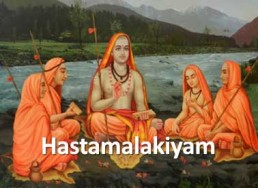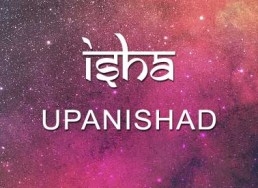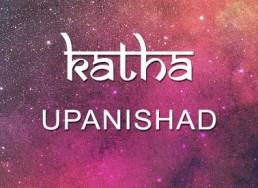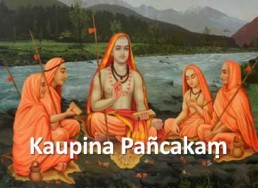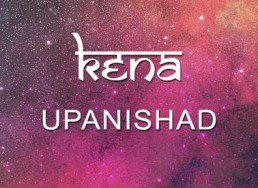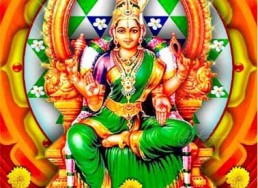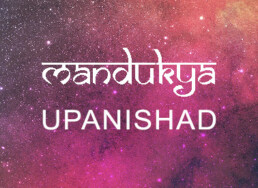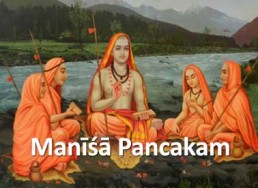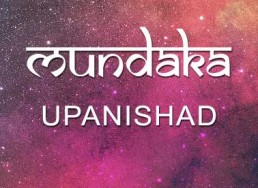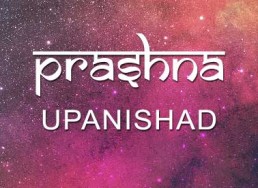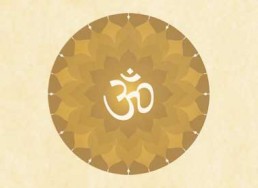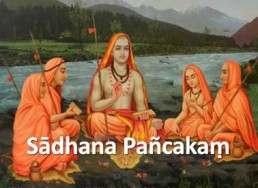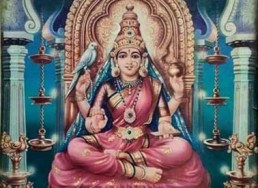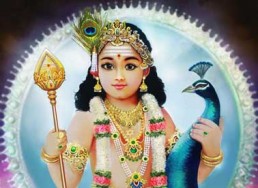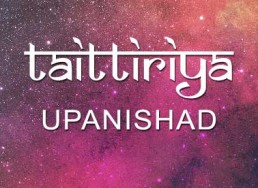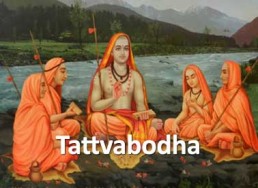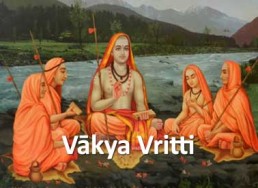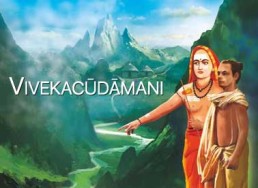Sruti Smrti
नमामि भगवत्पादम शंकरं लोक शंकरम्॥
namāmi bhagavatpādama śaṅkaraṃ loka śaṅkaram..
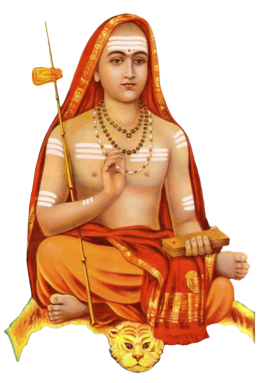
Description
In this verse, there is a statement of fact: Sri Sankara is srutismrtipurananam alayam. A shrine, a temple, is called alaya. Also any place where a sacred thing is kept is an alaya. Books are sacred, so a library is called pustakalaya. Sri Sankaracarya is an alaya of sruti-smrti-puranas. Sruti is all the Vedas, the karmakanda as well as the last portion of the Vedas known as Vedanta. Since sruti has come down to us through the rishis, there is no authorship (apaurusheyatvam), whereas, smrti has authorship. The kalpa-sutras are a development of the statements of the smrti, written by people who had a status similar to the one the rishis enjoyed. They knew about rituals, values, dharma, etc. All the dharma-sastras come under smrti. Even itihasa is called smrti. It is a combination of history and poetry, unlike Indian history, that is half history and half fiction! The purana appears on a bigger canvas. Its topic is entirely different. It talks about Bhagavan’s avataras. There are 18 puranas. All these together abide in one shrine that is Sri Sankara. He is the upadhi in which the entire subject matter of the sruti, smrti and puranas is enshrined, and is therefore called srutismrtipurananam alayam. Suppose, there is a living person who is an embodiment of all this vast knowledge but is maunibaba, a person committed to silence, not talking or writing, what would we get? There would be no way for us to learn anything from him. Maunibabas are always respected in our country. If Sri Sankara had been such a maunibaba, he might have had many devotees and one or two generations of those devotees might have remembered him. However, we definitely would not be celebrating his jayanti. Sri Sankara was not only an alaya of all-knowledge, but also an alaya of karuna, a person of great compassion through which he was able to reach out to others. It was Sri Sankara’s compassion, which made him what he was. Let us see how.
Sri Sankara taught his disciples who were with him, but he also made sure that the teaching came down to posterity through his writings. In those days, writing was not an easy job. There were no typewriters; there were no laptops, or even paper and pens. Sri Sankara had to do all his writing on palm leaves, and every copy was handwritten. There are hundreds of such manuscripts in India today, in spite of so many of them having been burnt or lost. They are enshrined in the homes of the people who have them. I do not think there is any culture other than Vedic culture that accords so much value to learning, whether it is scriptural or temporal.
Sri Sankara wrote extensive commentaries, bhashyas, on the Isa, Kena, Katha, Prasna, Mundaka, Mandukya, Taittiriya, Aitareya, Chandogya and the Brhadaranyaka Upanisads. All these bhashyas were written to include purvapaksas, objections and arguments, and the unfolding of the siddhanta, the main purport. When writing bhashyas, first, you have to give the anvaya, comprehensive meaning. After that, you should defend this analysis against any other possible meaning, or any other meaning given by somebody else. If one person thinks in one way, there will always be another person who thinks differently. People say that there are different schools of thought. When you are dealing with the reality, it has to be dealt with exactly as it is. There cannot be different schools of thought in arithmetic because one plus one can only be two. How can there be ‘schools of thought’ in understanding Isvara? But there were people who looked at Isvara differently. Sankara valued them all and discussed in detail leaving nothing to be desired.
You can give people the freedom to hold their ideas. There is nothing wrong in that, but there is no way of reconciling what is right with whatever is wrong. What is right is right. There is nothing to reconcile. A wrong thing has to be stated as wrong and understood as such. The other person has the freedom to hold a wrong idea. That is understandable. However, you cannot accept this wrong idea just because he is a nice person. You cannot have a charismatic approach in dealing with realities.
Thus, we can imagine the enormity of effort in writing all this on palm leaves. How much compassion Sri Sankara must have had for the spiritual upliftment of humanity, that he wrote all these books, and finally, the Brahma-sutra-bhashya. It is no ordinary feat. This is the proof of his compassion. Therefore, he is called srutismrtipurananam alayam karunalayam.
Namami bhagavatpadai sarkaram lokasankaram. I salute him whose name is Sri Śankara. Śam karoti iti Śankarah. Śankara is he who grants mangalam, an auspicious end, the grand finale to the winding journey of a jiva. The jiva’s history has to end. When will it end? Each birth is like yet another sheet of paper in a set of loose sheets that can never be bound together. It is endless; there is always a next birth. It is always an unbound book. The one who brings about that mangalam is Sankara Bhagavatpada, who is likened to Bhagavan. Unto him, my namaskara.
Excerpt from the book ‘Prayer Guide’ by Swami Dayananda Saraswati
Other Sankara Shlokams
Achyutashtakam
Achyutashtakam, composed by Sri Adi Shankaracharya, is in praise of Lord Krishna. It is a simple yet wonderful hymn of eight stanzas comprising the names of lord Vishnu with main emphasis on his incar
Annapurna Stotram
Annapurna is the goddess of food and nourishment. She is a form of Parvati, the inseparable shakti of Lord Shiva. Anna is translated as "food" and "grains" and purna means "full" or "complete". Annapu
Aparokshānubhuti
Shlokams,Prakarana Grantha,Sankara
Aparokshanubhuti, or Direct Experience of the Absolute is an introductory work by Adi Shankaracharya that expounds Advaita Vedanta philosophy. The word means Self-Realization
Ashtavakra Gita Home
Shlokams,Prakarana Grantha,Sankara
The Ashtavakra Gita is an ancient Sanskrit scripture that presents a powerful conversation between the sage Ashtavakra and King Janaka on the nature of the Self, liberation, and ultimate truth. Unlike many other spiritual texts, it is remarkable for…
Ātmabōdha
Shlokams,Prakarana Grantha,Sankara
Atmabodha, meaning Self-knowledge or Self-awareness, is an exceptionally lucid and readable work of Shankaracharya. Consisting of sixty-eight verses or shlokas, it is in a sense a simple summary of his entire Vedantic structure of thought, intended,…
Atmabodha All Verses
Shlokams,Atmabodha Verse,Sankara
Atmabodha - Full text with meaning, audio and translation from Sanskrit to English, Telugu, Kannada, Tamil and more
Ayigiri Nandini
The Mahishasura Mardini Stotram also known popularly as Aigiri Nandini, holds immense significance during Navratri. The word Mahisha means buffalo and Asura means Rakshasa or Demon. Composed by the great sage Adi Shankaracharya around 810 AD, this…
Ayigiri Nandini – Chanting – English
The Mahishasura Mardini Stotram also known popularly as Aigiri Nandini, holds immense significance during Navratri. The word Mahisha means buffalo and Asura means Rakshasa or Demon. Composed by the great sage Adi Shankaracharya around 810 AD, this…
Ayigiri Nandini – Chanting – Sanskrit
The Mahishasura Mardini Stotram also known popularly as Aigiri Nandini, holds immense significance during Navratri. The word Mahisha means buffalo and Asura means Rakshasa or Demon. Composed by the great sage Adi Shankaracharya around 810 AD, this…
Bhaja Govindam
Shlokams,Vishnu,Sankara,Govinda,Krishna,Prakarana Grantha
Bhaja Govindam is one of the most popular hymns penned by Adi Shankaracharya. He has packed into the Bhaja Govindam song the substance of all Vedanta, and set the oneness of Jnana and Bhakti to melodious music.
Bhavani Ashtakam
Composed by Sri Adi Shankaracharya. Bhavani Ashtakam is a popular hymn on Goddess Bhavani, who is known for her protection and merciful nature. The Lyrics of this hymn have an in-depth meaning that wh
Bilvashtakam
Composed by Sri Adi Shankaracharya, the famous Bilvashtakam extols the virtues of the Bilva leaf (also spelt Vilva, Bilwa) and Lord Shiva’s love for it. The following com
Bilvashtakam 14 Verses
Note: For the original version of Bilvashtakam please click here. Composed by Sri Adi Shankaracharya,
Brahmajnānavali Māla
Shlokams,Prakarana Grantha,Sankara
In this Prakarana Grantha (topical text or treatise) attributed to Sri Sankara the characteristics of the person who has realized that he is Brahman are described. The aspirant for liberation is advised to meditate on these in order to attain that…
Dakshinamurthy Stotram
Shlokams,Sankara,Shiva,Dakshinamurthy
The Dakshinamurti Stotra is a Sanskrit religious hymn to Shiva by Sri Adi Shankaracharya. It explains the metaphysics of the universe in the frame of the tradition of Advaita V
Dasa Shloki
Shlokams,Prakarana Grantha,Sankara
This composition in ten verses - dasha shloka - is similar to the Nirvana Shatakam, and like it, a summation, in typically Shankara's way, of the unyielding non-dual vision of Advaita. Here too, Shankara's attempt is to deny everything else only to…
Devi Aparadha Kshamapana Stotram
Composed by Sri Adi Shankaracharya. Aparadha Kshamapana stotram is usually recited after a recital or after the completion of Puja. Its like asking for forgiveness from Goddess for various mistakes th
Ganesha Pancharathnam
The composer, Guru Sri Adi Shankaracharya had praised the God Ganesha by presenting these five stanzas as five jewels, hence the name Maha Ganesha Pancharatnam.
Ganesha Stavah
Ganesha Stavah or Ganapati Stavah is a set of 13 verses that describe the glory of Lord Ganesha. Gaṇapati stavaḥ is said to be from Ganesh Purana - upāsanā khaṇḍa adhyāya 13.
Ganga Ashtakam
Gangashtakam is an octet on river Ganga composed by Shri Adi Shankaracharya.
Gangā stotram
Sri Adi Shankaracharya has written a song ”Devi Suresvari Bhagavati Gange” and the Official Name for this song is ”Sri Sri Ganga Stotram”. In this song Sree Shankaracharya describes the glories of Sri
Guru Ashtakam
The Guru Ashtakam is a Sanskrit hymn composed by Adi Shankaracharya, the 8th-century Indian philosopher and saint who consolidated the doctrine of Advaita Vedanta. In the Vedan
Guru Paduka Stotram
Guru Paduka Stotram is a very powerful chant that glorifies the "Padukas (Sandals) of the Guru," which are symbolically represented as "the boat to help cross the endless ocean
Hanuman Pancharatnam
Garland of five gems on Shri Hanuman composed by Shri Adi Shankaracarya.
Hastāmalakiyam
Shlokams,Prakarana Grantha,Sankara
Composed by Hastāmalaka Ācārya, a direct disciple of Adi Sankaracharya, the Hastāmalaka Stotraṁ or Hastāmalakiyam is a short Vedāntic text about the higher nature of the Self.
Ishavasya All Verses
Introduction to Isavasya Upanishad The Īśāvāsyopaniṣad—so called from its initial words—forms the concluding chapter of the Saṃhitā of the Suklayajurveda The name of
Ishavasya Upanishad
The Isha Upanishad is embedded as the final chapter of the Shukla Yajurveda and is one of the shortest Upanishads, with 18 verses. It is the very first Upanishad in the Muktika canon of 108 Upanishads.
Ishvaro Guru Atmeti
Shlokams,Shiva,Dakshinamurthy,Guru,Sankara
Salutations to Lord Dakshinamurti, who is all-pervasive like space but who appears (as though) divided as Lord, Guru, and the Self.
Jagannath Ashtakam
Shri Jagannath Ashtakam was composed by Adi Sankracharya in praise of Lord Jagannath on his visit to Puri. The merit of reciting the sacred Jagannath ashtakam carefully is such that, one becomes sinle
Kalabhairava Ashtakam
Composed by Sri Adi Shankaracharya. The hymn illustrates the personality of Kala Bhairava of Kashi, the God of Death(kala). Those who study these 8 verses on Kala Bhairava, which are enticing and whic
Kalika Ashtakam
The Kalika Ashtakam is a Sanskrit hymn of eight verses dedicated to Goddess Kali, the fierce and protective form of the Divine Mother. This devotional text focuses on Ka
Kamakshi Stotram
Composed by Sri Adi Shankaracharya. Goddess Kamakshi is a form of Tripura Sundari or Parvati or the universal mother goddess. The word is derived from the heritage “Ka” meaning Goddess Saraswati (Godd
Kanakadhara Stotram
Kanakadhara Stotram is a hymn (Stotra) composed in Sanskrit by Sri Adi Sankaracharya. Kanakadhara means “stream” (dhara) of “gold” (kanaka). The 21 stanzas of kanakadhārā stotram then became famous and are read by all devout Hindus for……
Kasi Viswanathashtakam
Composed by Sri Adi Sankaracharya in praise of Lord Shiva. That man who reads this octet with its meaning, which sings the praise of Shiva who is the lord of Varanasi, would get knowledge, wealth, gre
Katha Upanishad
The Katha Upanishad is embedded in the last 8 sections of the Krishna Yajurveda. It has two chapters divided into three Vallis each. It is a Mukhya upanishad and listed as #3 in the Muktika canon of 108 Upanishads.
Kathopanishad All Verses
The Katha Upanishad is a collection of philosophical poems representing a conversation between the sage Naciketas and Yama (god of death). They discuss the nature of Atman, Brahman and Moksha (liberation). The book is made up of six sections…
Kaupina Panchakam
Shlokams,Prakarana Grantha,Sankara
Kaupina Panchakam - This is a very short poem composed by Sri Adi Sankaracharya, with five stanzas that glorify the life of a Sannyasi. The Kaupina is made up of a rectangular strip of cotton cloth used to cover the genitals with the help of the…
Kena Upanishad
The Kena Upanishad is embedded inside the last section of the Talavakara Brahmanam of the Samaveda. It is a Mukhya upanishad and listed as #2 in the Muktika canon of 108 Upanishads.
Kenopanishad-All-Verses
The Kena Upanishad or Kenopanishad (Kenopaniṣat) (also known as the Talavakara Upanishad) elucidates the concept of nirguna (qualityless) Brah
Lakshmi Narasimha Karavalambam
Narasimha is a fierce avatar of the Hindu god Vishnu, one who incarnates in the form of part lion and part man to destroy evil and end religious persecution and calamity on Earth, thereby restoring Dh
Lalitha Panchakam
Composed by Sri Adi Shankaracharya in praise of mother Lalitha. The phalastuti of the stotram says the divine mother will give good knowledge, wealth, fame, happiness, fortune, and prosperity.
Lalitha Sahasranamam
Lalitha Sahasranamam is a sacred Hindu text from the Brahmanda Purana which lists the thousand names of the Hindu mother goddess Lalita Devi, a manifestation of the Divine Mother (Shakti), and is therefore used in the worship of Durga, Parvati,…
Mahishasura Mardini Storam
Mahishasura Mardini Stotram - This is a prayer to the Goddess who killed Mahishasura. “The place where Sri Mahishasura Mardini Stotram is sung every day, I will always be present and never leave.” - The Devi’s proclamation in the 12th chapter of the…
Mandukya Karika
The Mandukya Karika represents the first systematic philosophical exposition of Advaita Vedanta, transforming the concise twelve-verse Mandukya Upanishad into a comprehensive 215-verse treatise on non-dual philosophy.
Mandukya Upanishad All Verses
Mandukya Upanishad - A detailed Summary The Mandukya Upanishad is the shortest yet one of the most profound Upanishads, consisting of just 12 verses. It explores the n
Manishā Panchakam
Shlokams,Prakarana Grantha,Sankara
Adi Sankara’s ‘Manisha Panchakam’ refers to the conclusive wisdom or determinate knowledge asserted in five verses. Manisha means conclusive wisdom or determinate knowledge and Panchakam refers to the five verses.
Mauna Vyakhya
Shlokams,Sankara,Shiva,Dakshinamurthy
I salute Sri Dakshinamurti, who is not subject to time, who makes known the truth of Brahman through the implied meaning of words, who is surrounded by disciples who are themselves Rishis and committe
Meenakshi Pancharatnam
Meenakshi Pancharatnam (The five jewels of Meenakshi) is a popular stotram composed by Sri Adi Shankaracharya as a ritual incantation on goddess Meenakshi. This stotram explains the divine qualities,
Mundaka Upanishad
The Mundaka Upanishad is embedded is embedded in the Atharva Veda. It is a Mukhya upanishad and listed as #5 in the Muktika canon of 108 Upanishads.
Narmada Ashtakam
Composed by Sri Adi Shankaracharya in praise of river Narmada.
Nidhaye Sarvavidyanam
Shlokams,Sankara,Shiva,Dakshinamurthy
Salutations to Sri Dakshinamurti, the reservoir of knowledge (the abode of all learning), the healer of all those who suffer from the disease of samsāra, and the teacher of the whole world.
Nirvana Shatakam
Nirvana Shatkam (Atma Shatakam) of Adi Sankara Commentary and Notes Translated by S. N. Sastri Introduction: Sri Sankara Bhagavatpada has blessed poster
Om Namah Pranavarthaya
Shlokams,Sankara,Shiva,Dakshinamurthy
Om. Salutation to the one who is the meaning of praņava, who is in the form of pure knowledge, who is taintless and who is free from any change. To that Sri Dakshinamurti, (my) salutations.
Om Namo Bhagavate Dakshinamurthaye
Shlokams,Sankara,Shiva,Dakshinamurthy
Om. Salutations to Bhagavan Dakshinamurti. (Oh Lord) Bless me with memory, the capacity to think properly, and clarity, wisdom.
Pandurang Ashtakam
Shri Pandurang ashtakam (Pandurangashtakam) Stotra is a very beautiful creation of Shri Adi Shankaracharya. Lord Vithal, or Panduranga Vittala, is an incarnation of Lord Vishnu and is worshipped in t
Prashna Upanishad
The Prashna Upanishad is embedded is embedded in the Atharva Veda. It is a Mukhya upanishad and listed as #5 in the Muktika canon of 108 Upanishads.
Prashnopanishad-All-Verses
The Prashnopanishad (Prashna Upanishad) is a key philosophical text within the Indian spiritual tradition, part of the larger body of literature known as the Upanishads.
Prātah Smaranam
Pratah Smaranam is a prayer composed by Sri Adi Shankaracharya consisting of three stanzas in which the mind (manas) speech (vak), and body (kaya) of the individual are
Ranganatha Ashtakam
Ranganatha Ashtakam was written by Adi Sankara Bhagavatpada when he stood before Sri Ranganatha swamy in Srirangam, during his travels. This Ashtakam reveals that Adi Sankara was overwhelmed by Lord R
Sādhana Panchakam
Shlokams,Prakarana Grantha,Sankara
Sadhana Panchakam - Adi Sankara in these five simple looking verses lovingly lists the ways and means which can readily be followed by all students of Vedanta, seeking direct experience of the divine state beyond the mind, the spring of…
Sankaram Sankaracharyam
Salutations again and again to Lord Shiva in the form of Sri Sankaracharya and Lord Vishnu in the form of Veda Vyasa, who were the authors of sutra and bhasya.
Saundarya Lahari
Shlokams,Prakarana Grantha,Sankara
The Saundarya Lahari, a devotional poem of one hundred hymns, is ascribed to the great teacher Shankaracharya. The poem is divided into two parts; the first part, comprised of verses 1 through 41, is called the Anandalahari, or Wave of Bliss, and…
Sharada Bhujangam
Composed by Sri Adi Shankaracharya on devi Sharada. Sringeri is the first math (monastery) built by Sri Adi Shankaracharya. It has the famous temple of Devi Sharada inside it. The math is situated on
Shiva Aparadha Kshamapana Stotram
The Śiva Aparādha Kṣamāpaṇa Stotram, or "Hymn of Forgiveness for Offenses to Lord Śiva," is a heartfelt composition by the revered philosopher and saint Śrī Ādi Śaṅkarācārya. T
Shiva Ashtakam
Composed by Adi Shankaracharya. This ashtakam is a descriptive salutation of the different attributes of Shiva. The great yogi who is referred to as Ardhanarishwara (the one who has included the femin
Shiva Manasa Puja
Sri Adi Shankaracharya composed this mantra for lord Shiva. Using this stotra, we can perform mental worship of Lord Shiva.
Shiva Pratah Smaranam
This is a short and beautiful 'Three Shloka Prayer' that makes the start of the day full of energy and happiness. Composed by Sri Adi Shankaracharya.
Soundarya Lahari All Verses
Soundarya Lahari, meaning "Waves of Beauty," is a revered Sanskrit literary work attributed to Adi Shankaracharya, the great philosopher and theologian who consolidated the doctrine of Advaita Vedanta in the 8th century. This composition is not just…
Subramanya Bhujangam
Sri Subramanya bhujangam is a stotra sung under inspiration by Sri Adi Shankaracharya at Thiruchendur ( presently located in Tamil Nadu, India). When he meditated upon SrI Subrahmanya, he became aware
Taittiriya Upanishad
The Taittiriya Upanishad is one of the primary Upanishads, as part of the Yajur Veda. It says that the highest goal is to know the Brahman, for that is Truth. It is divided into three sections, 1) the Siksha Valli, 2) the Brahmananda Valli and 3)…
Tattvabodha
Shlokams,Prakarana Grantha,Sankara
For anyone wishing to understand the essential tenets of Shankaracharya's philosophy and the Advaita vision, the Tattvabodha, which broadly translates to the 'knowledge of truth', is mandatory reading. In it, Shankara, as the teacher, puts down the…
Totakashtakam
The Toṭakāṣṭakam was composed by Giri (an enlightened disciple) in praise of his Guru Adi Sankara. Literally, it means a rhyme of eight (Sanskrit: aṣṭa) verses (ślokas) in the meter called Totaka.
Vākya Vritti
Shlokams,Prakarana Grantha,Sankara
Of the four Mahāvākyas, the statement containing the entire instruction of the teacher is 'Tat Tvam Asi' or 'That Thou Art'. Exposition of this pithy but pregnant sentence (vākya), is accomplished by Adi Sankara in a collection of 53 verses called…
Vedasara Shiva Stava
Vedasara Shiva Stava: The Essence of Vedic Wisdom The Vedasara Shiva Stava is a beautiful 10-verse hymn written by Adi Shankaracharya in praise of Lord Shiva. The name
Vishnu Shatpadi Stotram
The Sri Vishnu Shatpadi is a revered Sanskrit stotra (hymn) dedicated to Lord Vishnu, the preserver and protector in Hinduism. Composed by the illustrious philosopher and saint, Sri Shankaracharya, this hymn comprises six verses (ṣaṭpadī) that…
Vivekachudamani
Shlokams,Prakarana Grantha,Sankara
The Vivekachudamani is the crown jewel of the Prarkarana texts (philosophical treatises) authored by Sri Adi Sankaracharya. The title translates to ‘Crest Jewel of Discrimination’, referring to the discrimination between the real and unreal.
Yamuna Ashtakam
Composed by Sri Adi Shankaracharya. In Yamunastakam’s first eight shlokas, Sri Adi Shankaracharya describes Shri Yamunaji’s eight fold powers, its divine & wonderful idol and her divine qualities. Shr
Sruti Smrti – Sankara – In Sanskrit with English Transliteration, Translation and Meaning. Commentary for selected Shlokams. With commentary by Swami Dayananda

